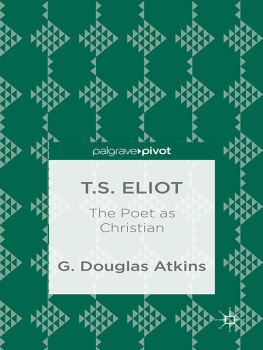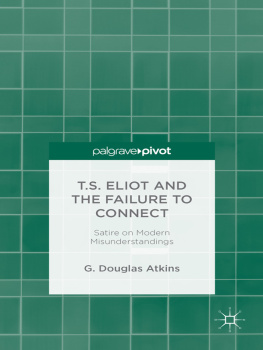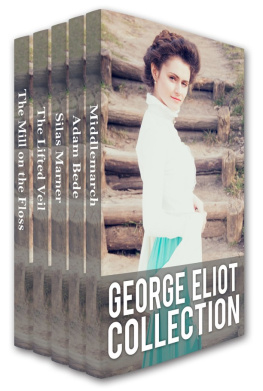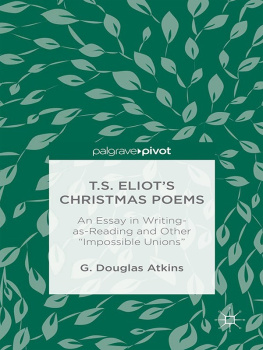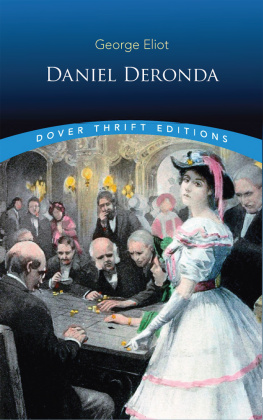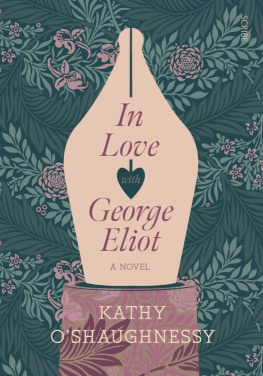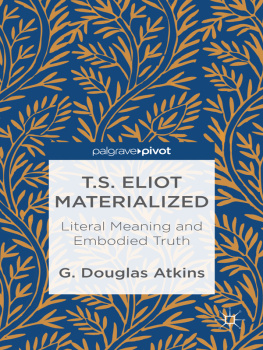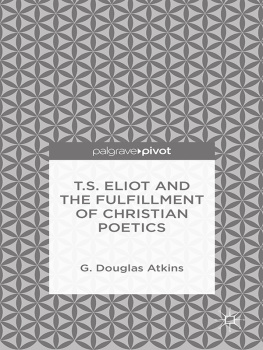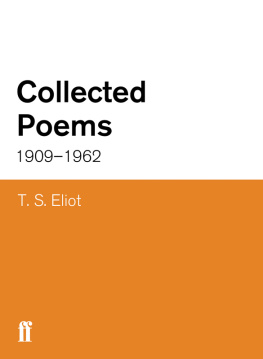Atkins George Douglas - T.S. Eliot: The Poet as Christian
Here you can read online Atkins George Douglas - T.S. Eliot: The Poet as Christian full text of the book (entire story) in english for free. Download pdf and epub, get meaning, cover and reviews about this ebook. year: 2014, publisher: Palgrave Macmillan, genre: Detective and thriller. Description of the work, (preface) as well as reviews are available. Best literature library LitArk.com created for fans of good reading and offers a wide selection of genres:
Romance novel
Science fiction
Adventure
Detective
Science
History
Home and family
Prose
Art
Politics
Computer
Non-fiction
Religion
Business
Children
Humor
Choose a favorite category and find really read worthwhile books. Enjoy immersion in the world of imagination, feel the emotions of the characters or learn something new for yourself, make an fascinating discovery.
- Book:T.S. Eliot: The Poet as Christian
- Author:
- Publisher:Palgrave Macmillan
- Genre:
- Year:2014
- Rating:4 / 5
- Favourites:Add to favourites
- Your mark:
- 80
- 1
- 2
- 3
- 4
- 5
T.S. Eliot: The Poet as Christian: summary, description and annotation
We offer to read an annotation, description, summary or preface (depends on what the author of the book "T.S. Eliot: The Poet as Christian" wrote himself). If you haven't found the necessary information about the book — write in the comments, we will try to find it.
T.S. Eliot: The Poet as Christian — read online for free the complete book (whole text) full work
Below is the text of the book, divided by pages. System saving the place of the last page read, allows you to conveniently read the book "T.S. Eliot: The Poet as Christian" online for free, without having to search again every time where you left off. Put a bookmark, and you can go to the page where you finished reading at any time.
Font size:
Interval:
Bookmark:
T.S. Eliot
Also by G. Douglas Atkins
THE FAITH OF JOHN DRYDEN: Change and Continuity
READING DECONSTRUCTION/DECONSTRUCTIVE READING
WRITING AND READING DIFFERENTLY: Deconstruction and the Teaching of Composition and Literature (co-edited with Michael L. Johnson)
QUESTS OF DIFFERENCE: Reading Popes Poems
SHAKESPEARE AND DECONSTRUCTION (co-edited with David M. Bergeron)
CONTEMPORARY LITERARY THEORY (co-edited with Laura Morrow)
GEOFFREY HARTMAN: Criticism as Answerable Style
ESTRANGING THE FAMILIAR: Toward a Revitalized Critical Writing
TRACING THE ESSAY: Through Experience to Truth
READING ESSAYS: An Invitation
ON THE FAMILIAR ESSAY: Challenging Academic Orthodoxies
LITERARY PATHS TO RELIGIOUS UNDERSTANDING: Essays on Dryden, Pope, Keats, George Eliot, Joyce, T.S. Eliot, and E.B. White
T.S. ELIOT AND THE ESSAY: From The Sacred Wood to Four Quartets
READING T.S. ELIOT: Four Quartets and the Journey toward Understanding
E.B. WHITE: The Essayist as First-Class Writer
T.S. ELIOT MATERIALIZED: Literal Meaning and Embodied Truth
SWIFTS SATIRES ON MODERNISM: Battlegrounds of Reading and Writing
ALEXANDER POPES CATHOLIC VISION: Slave to no sect
T.S. ELIOT AND THE FAILURE TO CONNECT: Satire and Modern Misunderstandings
T.S. ELIOT, LANCELOT ANDREWES, AND THE WORD: Intersections of Literature and Christianity
SWIFT, JOYCE, AND THE FLIGHT FROM HOME: Quests of Transcendence and the Sin of Separation

T.S. Eliot: The Poet as Christian
G. Douglas Atkins


T.S. ELIOT
Copyright G. Douglas Atkins, 2014.
All rights reserved.
First published in 2014 by
PALGRAVE MACMILLAN
in the United Statesa division of St. Martins Press LLC,
175 Fifth Avenue, New York, NY 10010.
Where this book is distributed in the UK, Europe and the rest of the world, this is by Palgrave Macmillan, a division of Macmillan Publishers Limited, registered in England, company number 785998, of Houndmills, Basingstoke, Hampshire RG21 6XS.
Palgrave Macmillan is the global academic imprint of the above companies and has companies and representatives throughout the world.
Palgrave and Macmillan are registered trademarks in the United States, the United Kingdom, Europe and other countries.
ISBN: 9781137444486 EPUB
ISBN: 9781137444462 PDF
ISBN: 9781137446886 Hardback
Library of Congress Cataloging-in-Publication Data is available from the Library of Congress.
A catalogue record of the book is available from the British Library.
First edition: 2014
www.palgrave.com/pivot
DOI: 10.1057/9781137444462
Contents
Preface and Acknowledgments
I have written a good deal about Old Possum recently, revealing at least two faults: a near-obsession with the poet, the essayist, and the dramatist, and a stubborn, relentless ongoing essai to get him right. The present book follows from, without repeating or replacing, the most recent, a study of Eliot and his relation to the particular ways of both writing and reading embodied in the sermons of the seventeenth-century Anglican Divine Lancelot Andrewes.
Bishop Andrewess way of writing and reading has been succinctly described by (my fellow-eighteenth-century scholars) John Butt and Geoffrey Tillotson, introducing the Cambridge University Plain Texts edition of Andrewess sermons on the Resurrection:
Andrewes business here is exegesis. His interest lies only in the text and he does not consider his work finished until every word has directed a separate pencil of light into the heart of his subject.... It is his theme which masters Andrewes.... His style progresses with the imperturbable tattoo of a Morse signal. He escapes the muddiness of many of Donnes sermons and has no use for his ecstasies. Where everything is equally important there is no need for rhetoric.
In his brilliant commentary in the 1928 book that he prefaced with the famous announcement that he was classicist in literature, royalist in politics, and anglo-catholic in religion, Eliot himself opens the way for Professors Butt and Tillotson by demonstrating in theory and practice Bishop Andrewess squeezing and squeezing of a word until it yields a full juice of meaning which we should never have supposed any word to possess. Although the procedure is obviously susceptible to abuse, it constitutes the focal point of my reading of Eliots poems. Lancelot Andrewess writing is also the basis of Eliots understanding of the Incarnation and of a complementary and entailed way of writing (and reading): philological, comparative, and meditative. What we might call Eliots theology of the word becomes a theology of the Word (and perhaps vice versa).
I take from Bishop Andrewes that intensely verbal concentration; from Eliot, I take the complementary comparative, or intra-textual, manner. Inter-textuality enhances the play of intra-textuality, with the result that I am constantly following Eliots further advice and weighing one thing by another, often its apparent opposite. From Andrewes and Eliot together, then (but not necessarily in the order of my listing of debts), I take an (Incarnational) understanding, based in paradox and impossible union (Four Quartets), with which I approach the writing and the reading of poetry. Incarnation forms the thematic heart and soul as well as the structural pattern represented and dramatized in Eliots post-conversion poems.
Comparing Ash-Wednesday: Six Poems with the Ariel poems, the works in verse closest in time to Andrewess most profound and revealing effects on Eliots understanding and his writing opens up fresh new perspectives on the situation, burden, responsibilities, and opportunities faced by the poet who is (also) a Christian. In order to delineate and define the way of the poet writing as a Christian, I compare the new writing, post-conversion, with that done under the old dispensation, in the process discovering differences and similarities heretofore scanted in previous commentary. The complex, both/and nature of Christianity poses particular problems and difficulties for the poet at once true to his or her understanding and responsible and scrupulous as a poet and thus a steward of words.
This book is, then, fundamentally about T.S. Eliots perhaps most under-read, misread, and most challenging and demanding works, the so-called conversion poem and five Ariel Poems (counting the oft-dismissed The Cultivation of Christmas Trees, included among Faber and Fabers new Ariel poems in 1954, a sort of second-coming that book-ends with the story of the first coming, and the coming to it, Journey of the Magi). The present volume also engages in de-confining critical procedures by (paradoxically) returning attention to the primary units of attention, those things composed of mere letters, the literal facticity of words themselves. I subscribe completely to Old Possums little-noticed declaration that the letter giveth life.
I gratefully acknowledge my debts once more to Brigitte Shull at Palgrave Macmillan, who supports, encourages, facilitates, and opens a way; Erin Ivy, who introduced me to Palgrave Macmillan; Pam LeRow and Lori Whitten, who make my work easier; Leslie, Christopher, Kate, Oliver, Craig, and Sharon, who make me proud; and my wife Rebecca, who not only makes me proud but also makes both my work and my life easier and happier.
Next pageFont size:
Interval:
Bookmark:
Similar books «T.S. Eliot: The Poet as Christian»
Look at similar books to T.S. Eliot: The Poet as Christian. We have selected literature similar in name and meaning in the hope of providing readers with more options to find new, interesting, not yet read works.
Discussion, reviews of the book T.S. Eliot: The Poet as Christian and just readers' own opinions. Leave your comments, write what you think about the work, its meaning or the main characters. Specify what exactly you liked and what you didn't like, and why you think so.

